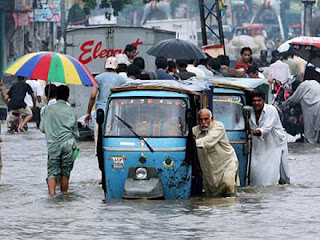Q1. What is the main point of the article?
· The article attempts to answer whether the wild weather patterns lately, including the torrential Pakistani flood, a record-breaking heatwave that killed hundreds, and droughts in the United States
Q2. List four vocabulary words that you do not recognize or understand, lookup the definitions, write them out using your own words.
· Frequency – the number of times at which an event occurs
· Intensity – the strength/degree of something
· Variability – the ability to vary, or change
· Static – staying in one place, non-changing, invariability
Q3. What is the difference between “weather” and “climate”?
· Weather is the condition of the Earth in a short period of time, while climate indicates weather patterns through a longer period of time.
Q4. What are the examples listed in the article of “extreme weather”?
· Monsoon rains in Pakistan
· A Russian record-breaking heat wave along with a drought destroyed a lot of wheat farmland and sparked wildfire in the forests that killed dozens of people.
· Flooding in the United States destroyed New England , and an intense heat wave baked eastern part of the country.
Q5. What experiences have you had with “extreme weather”?
· My experiences of weather in Ho Chi Minh City
 |
| Flood in Pakistan |
Q6. What does the word “perception” mean?
· Perception means one’s interpretation of something, one’s comprehension and understanding of something
Q7. What is your “perception” of global climate change?
· As a person, I believe that global climate change is a very important issue for human beings. Even though we still have not had enough proof to prove that climate change is linked to the increased frequency and intensity of these natural disasters, still we should prepare early. How does it hurt when you turn off the air-conditioners and switch to compact fluorescent bulbs? J